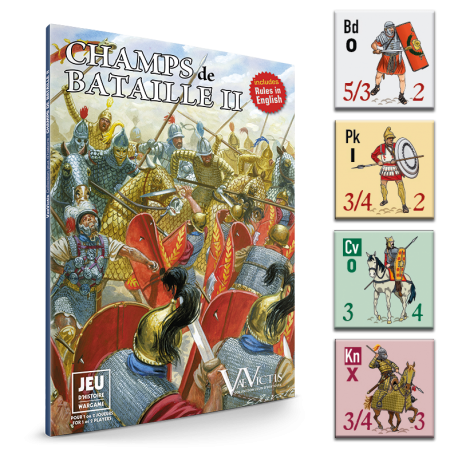








This second volume of the new edition of Fields of Battle takes us from the end of the Roman Republic to the beginning of the Empire. It covers the wars against Mithridates VI Eupator the King of Pontus, the conquest of Gaul by Caesar, the civil wars of the First and second Triumvirates, the wars against Parthia.
 Garanties sécurité
Garanties sécurité
(à modifier dans le module "Réassurance")
 Politique de livraison
Politique de livraison
(à modifier dans le module "Réassurance")
This second volume of the new edition of Fields of Battle takes us from the end of the Roman Republic to the beginning of the Empire. It covers the wars against Mithridates VI Eupator the King of Pontus, the conquest of Gaul by Caesar, the civil wars of the First and second Triumvirates, the wars against Parthia.
The legions have beaten the Macedonian phalanx at Cynoscéphales in 197 before J. - C., then at magnesia in 189 before J. - C. and finaly at Pydna in 168 before J. - C. but it will fight it again during the Mithridatic Wars. The legion itself change drastically under Marius to become a professional and standartized war machine.
The Roman Army will fight the Gauls, the formidable Partian cataphracts and tear each other apart in civil wars of succession.
Champs de Bataille is a board game largely inspired by an English rule for miniatures called De Bellis Multitudinis and published by the Wargames Research Group in the early 1990s, four booklets of army lists ranging from 3000 BC. to 1500 accompany this rule.
The General Classification of Troops allows not only armies to compete in historical battles, but also thanks to its budgeting system, non-historical adversaries, providing «What if?» practically endless.
The adaptation for board game makes it possible to play on a small surface and without figurines many battles of antiquity with on average between 20 to 30 counters on each side.
Overlays to be cut are also provided to vary the battles.
No one game of Champs de Bataille will be the same.
Through six lists that will allow you to experiment with many army combinations and five historical scenarios(*), this module will give you the opportunity to replay many battles with a relatively simple system.
Other scenarios will be given in the future in the magazine or on the website.
(*) Chaironeia (86 BC.), Bibactre (58 BC), Pharsalus (48 BC), Philippi (42 BC), Taurus (39 BC)
Game components:
Data sheet